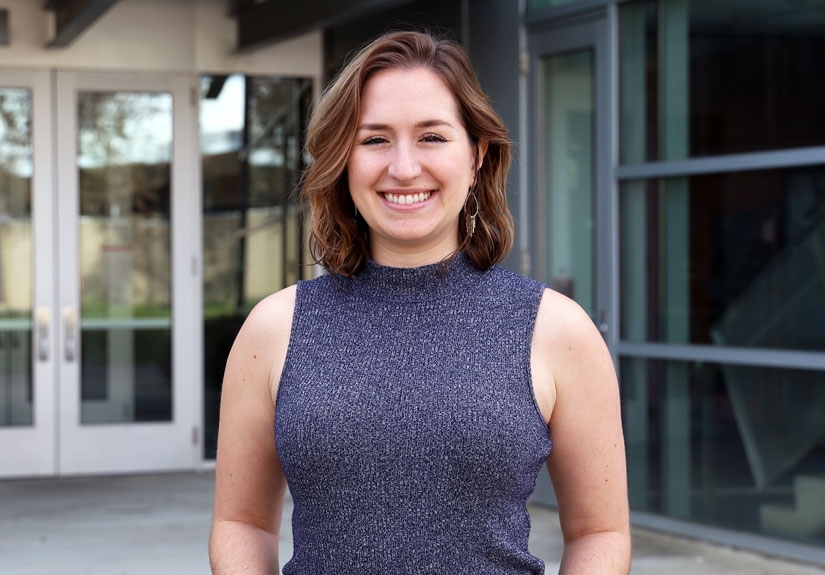Public Health Buckeyes: Rachel Mason
PhD student explores burdens patients face navigating health care system

Meet Rachel Mason, a second-year PhD student in health services management and policy from East Liverpool, Ohio. Her passion for addressing health disparities and enthusiasm for interdisciplinary studies drives her research on health care challenges.
Q & A
What drew you to a public health education?
I spent a lot of my free time in undergrad learning about different health conditions and their causes. While I was not a public health major (Spanish literature and psychology), a professor recommended that I look into public health since I wanted to go to graduate school and it appeared that my interests aligned. She was right! I connected some of the research I had already been doing with my MPH studies. Public health supports my interdisciplinary interests and grounds them in an applied way.
What makes you passionate about addressing health disparities in your research?
There are many pervasive health issues in my hometown that seemed wholly unchangeable prior to my public health education. I now feel called to identify health disparities and develop my skillsets further through my doctoral training. My passion about addressing health disparities does not stop at my own front door. It is necessary to disrupt policies and standards that disadvantage marginalized groups, particularly in terms of racism, sexism, homophobia, transphobia and ableism.
You presented two papers at the American Public Health Association’s 2022 meeting. What was that experience like?
I was flattered to be asked to present work that Thomas Wickizer and I have been working on together throughout the past year. I attended the conference in 2018 but I hadn’t presented before. After presenting in front of my colleagues and some faculty members, I felt prepared to share the findings of our work with the field more broadly. During the question-and-answer portion of the presentation, I was particularly encouraged by the feedback from the audience members. We have already started to integrate some of their suggestions!
One of those papers explores the idea of patient administrative burden in health care. Can you explain what that means and why it’s important?
Patient administrative burden in health is an important concept that has yet to be fully investigated by health services researchers. By patient administrative burden, I mean an individual’s experience of policy implementation as onerous. Examples of administrative tasks that could become onerous are clinical appointment scheduling, information seeking about a condition or procedure, prior authorization, billing issues and insurance premium problems.
Past research has investigated administrative burden for health insurance companies and health care providers, but little research has attempted to quantify the costs that administrative burden has caused on patients, who have no role in designing administrative rules and procedures.
How has your experience as a Graduate School Distinguished University fellow enriched your time at Ohio State?
My fellowship has allowed me the opportunity to explore my scholarly interests through higher engagement with classes, as well as the flexibility to get involved with research I likely would not have had time for otherwise. I have been able to take classes in other departments, such as sociology and women’s, gender, and sexuality studies and work on research with health economists. On the surface these may appear to be disparate areas, but I am thankful that my fellowship has enabled these experiences and has allowed me time to seek out the throughlines.
What are your goals for the future?
After completing my PhD, I aim to address health disparities through mixed methods research. I hope to work at an academic medical center as a principal investigator. In this role, I anticipate directing research projects focused on community needs and fostering young scientists’ aspirations.
What advice would you give to undergraduate students pursing public health?
It is paramount to care for yourself, particularly in a field where we find ourselves motivated to improve the health of others. In the field of public health, our aims are long-term and require planned and dedicated effort.
In relation to discovering what sparks your interest, be patient with yourself. My approach to determining my next steps were to seek out opportunities that excited me and taught me new skillsets.
About The Ohio State University College of Public Health
The Ohio State University College of Public Health is a leader in educating students, creating new knowledge through research, and improving the livelihoods and well-being of people in Ohio and beyond. The College's divisions include biostatistics, environmental health sciences, epidemiology, health behavior and health promotion, and health services management and policy. It is ranked 22nd among all colleges and programs of public health in the nation, and first in Ohio, by U.S. News and World Report. Its specialty programs are also considered among the best in the country. The MHA program is ranked 5th and the health policy and management specialty is ranked 21st.